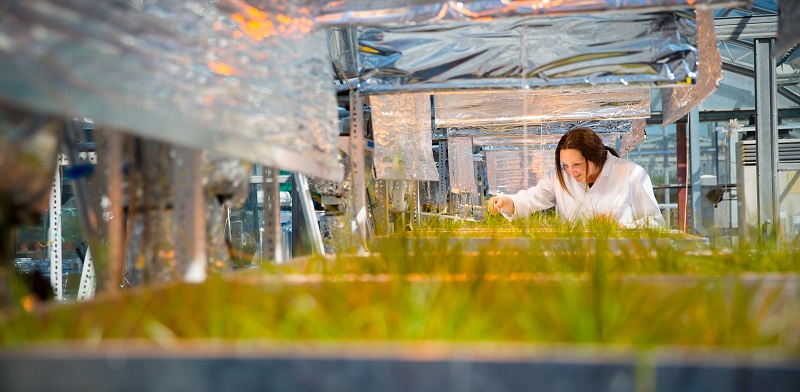Aberystwyth University grasses that feed the world considered one of the UK’s best breakthroughs

Grass research at the Institute of Biological, Environmental and Rural Sciences at Aberystwyth University
14 December 2018
Pioneering work at Aberystwyth University that has led to the production of new varieties of high sugar grasses features as one of the UK’s 100 best breakthroughs in recognition of its transformational environmental and economic benefits.
The work features in the UK’s Best Breakthroughs list: 100+ Ways Universities Have Improved Everyday Life, compiled by Universities UK, the umbrella group for UK universities.
The list forms part of the MadeAtUni campaign to change public perceptions of universities and bring to life the difference they make to people, lives and communities across the UK.
The development of Aber High Sugar Grasses (AberHSG) for feeding livestock is carried out at the Institute of Biological, Environmental and Rural Sciences (IBERS), which celebrates 100 years of plant breeding in 2019, in close collaboration with industry partner Germinal.
These grasses drastically reduce greenhouse gas emissions from livestock while at the same time increasing the yield from livestock products, so helping to feed the world’s population more sustainably.
The development of these high sugar grasses is just one example of how the University’s scientists are combining fundamental research on plant genetics with plant breeding techniques to develop new commercially viable plant varieties that are designed to tackle the global challenges of food, water and energy security.
Today almost a third of the perennial ryegrass grown by UK farmers comes from seed developed by Aberystwyth University researchers, with varieties including AberMagic, AberDart and AberGreen also used internationally.
The UK’s Best Breakthroughs list was compiled following independent research undertaken by Britain Thinks which found that the public has little understanding of the benefits of universities beyond undergraduate teaching.
The list demonstrates how UK universities are at the forefront of some of the world’s most important discoveries, innovations and social initiatives, including the discovery of penicillin, work tackling plastic pollution, ultrasound scans to check the health of unborn babies and the establishment of the Living Wage.
The list also highlights the less celebrated but vital breakthroughs that transform lives, including a specially-designed bra to help women undergoing radiotherapy; a toilet that flushes human waste without the need for water; the development of a new scrum technique to make rugby safer; a sports initiative that aims to use football to resolve conflict in divided communities; - and even work to protect the quality of the chocolate we eat.
Professor Chris Thomas, Pro Vice-Chancellor for Research, Knowledge Exchange and Innovation at Aberystwyth University said: “We are delighted that the innovative work of our scientists has been recognised by inclusion in the UK’s Best Breakthrough list. The ground-breaking research conducted by our academics makes a real difference to people, lives and communities, and the MadeAtUni campaign allows students, alumni, the local community and the wider population to understand the work that we do and the impact it has.”
Professor Dame Janet Beer, President of Universities UK, said: “Universities really do transform lives. The technology we use every day, the medicines that save lives, the teachers who inspire – all come from UK universities and the important work being done by academics.
“The UK’s Best Breakthroughs list is a testament to the difference that universities make to people’s lives and we want everyone to join us in celebrating the work they do.”
You can find out more about the UK’s Best Breakthroughs and the MadeAtUni campaign here www.madeatuni.org.uk.



